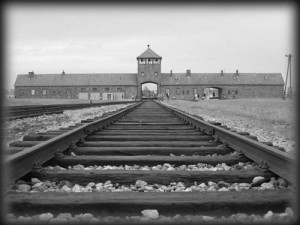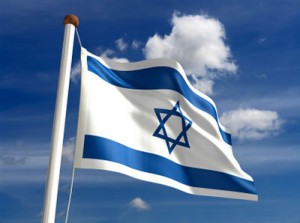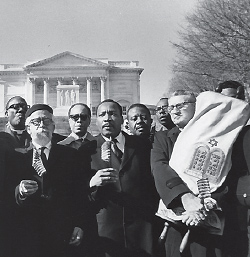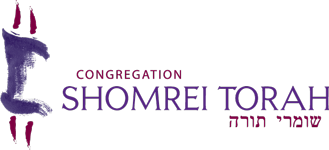The roster of Jewish holy days this time of year functions like a Rorschach chart for Jewish identity.
Passover, for example, has many themes but it is safe to say that concern for the oppressed or Social Justice is its main focus, which is also the essence of Jewish identity for many Jews. This is certainly true at Shomrei Torah, where our largest committee is the Social Action Committee with 28 members! There is only one problem: concern for Social Justice is not particular to Judaism. Christians, Muslims, Hindus, and Buddhists can all lay claims to a concern for the most vulnerable: the weak, the persecuted.
 After Pesach comes Yom HaShoah, Holocaust Memorial Day, one of the darkest days in the Jewish year and yet another defining aspect of Jewish life: persecution. Sadly, our being a persecuted people is the defining feature of Jewish identity for more than a few of us. For these folks, our communal suffering becomes a point of pride, an end in itself. Our survival is proof of our worth and our need for constant vigilance against future attacks is the only justification necessary for Jewish continuity.
After Pesach comes Yom HaShoah, Holocaust Memorial Day, one of the darkest days in the Jewish year and yet another defining aspect of Jewish life: persecution. Sadly, our being a persecuted people is the defining feature of Jewish identity for more than a few of us. For these folks, our communal suffering becomes a point of pride, an end in itself. Our survival is proof of our worth and our need for constant vigilance against future attacks is the only justification necessary for Jewish continuity.
This was the Judaism of my youth: the Shoah on the one hand and Israel struggling for survival on the other, and nothing of substance in between. We were to care, to show up, to give, just because of what “they did to us” and what “could happen again at any moment!” No wonder so many folks in my generation fled Jewish life. Why be Jewish if the essence of Jewish life is suffering and the constant threat of persecution?
 This was an issue of great concern for David Hartman (May his memory be for a blessing), who wrote in his book A Heart of Many Chambers, “I believe it is destructive to make the Holocaust the dominant organizing category of modern Jewish identity. It is both politically and morally dangerous … to perceive … (ourselves) essentially as the suffering remnant of the Holocaust. It is pointless and often vulgar to argue that the Jewish peoples’ suffering is unique in history.” (pg. 261)
This was an issue of great concern for David Hartman (May his memory be for a blessing), who wrote in his book A Heart of Many Chambers, “I believe it is destructive to make the Holocaust the dominant organizing category of modern Jewish identity. It is both politically and morally dangerous … to perceive … (ourselves) essentially as the suffering remnant of the Holocaust. It is pointless and often vulgar to argue that the Jewish peoples’ suffering is unique in history.” (pg. 261)
To be defined by what the Nazi’s did to us is to give them a posthumous victory, and to lose much of what makes Judaism so compelling. Judaism is not just about suffering! More than anything else, Judaism is about affirming life. “L’chaim,” “To life!” This is almost completely lost when the Shoah becomes the primary event in our long history.
 A week after Yom HaShoah comes Yom Ha-Atzmaut, Israeli Independence Day. This too is a cornerstone of Jewish identity in two distinct ways:
A week after Yom HaShoah comes Yom Ha-Atzmaut, Israeli Independence Day. This too is a cornerstone of Jewish identity in two distinct ways:
For many, if not most Israelis, the modern state is the organizing element of their Judaism; they are “National Jews.” Living in Israel, being an Israeli citizen, speaking Hebrew, serving in the army – this is their “Judaism”. It includes religious elements like Friday night dinners for example, in the same way that Christianity is passively part of many Americans’ identity, but its primary character is national, not religious.
There are also Diaspora Jews whose primary identity is their attachment or connection to Israel. These folks live vicariously through their connection with Israel. They have no need for Jewish observance, and their connection to the organized Jewish community is based only on its support of Israel. For them, Israel is an idealized, sentimentalized place. When they visit, they see only the good stuff: suntanned, muscle-bound Israelis “draining swamps and making the desert bloom” or more recently, “Startup nation.” For these folks, Israel can do no wrong and it is an unforgivable sin to criticize Israel in any way.
After Yom Ha-Atzmaut, there is one last major Holy Day to mention and that is Shavuot, the third of the three ancient pilgrimage festivals (Sukkot, Pesach and Shavuot), and the commemoration of “Natan Torah,” the giving of the Torah at Mt. Sinai.
Most liberal Jews don’t even know from Shavuot yet I think: of all the commemorations at this time of year, it’s the most essential to who we are.
 Simply stated, there is no Judaism without Torah. “Torah” here does not just mean the first five books of Moses. Torah, in this sense, is the symbol for Jewish life; the books, the holydays, the prayers; everything that makes up the religious life of a Jew.
Simply stated, there is no Judaism without Torah. “Torah” here does not just mean the first five books of Moses. Torah, in this sense, is the symbol for Jewish life; the books, the holydays, the prayers; everything that makes up the religious life of a Jew.
But, you say, “I am spiritual not religious.” Fine, but are you also Jewish? If so, you have to in some way connect with Torah to sustain your Judaism: “where’s the beef?” Where is the substance without Torah? And who says Torah is not spiritual?
Are you sure what you call “spiritual” cannot be found, enhanced or encompassed by Torah?
“Wait a minute, rabbi, I’m a cultural Jew.” In the global village cultural identities are very hard to preserve, let alone transmit to the next generation – what’s Jewish about bagels anymore? What is Jewish culture without Torah? Can you imagine a Jewish world where there are no synagogues and only JCC’s? I don’t think so.
I admit I’ve been a little hyperbolic and bombastic; it is one of the risks of being a rabbi. In truth, Jewish identity is a lot less black and white than I have suggested and much more in the grey. They say if you cut a hologram into pieces, all the parts contain the whole picture in them. That’s like Jewish identity – dig deep enough in any of us, you can find most if not all the elements of Jewish identity; each one of us has our own way of balancing these various aspects of what it means to be a Jew. The question is, are we happy with the balance?

Excellent points, and a great perspective on the American Jewish experience. Upon reading it, it’s just as thought-provoking and well-reasoned as it was when I heard you deliver it as your sermon on Friday night.
Thank you for always taking the time to think and to teach.
I think this will invite people to reflect on their own commitment to Judaism and find out where they stand. I don’t think a person can “be Jewish” without some investment in the Torah since that’s the reason for us to actually live Jewishly. Just because someone doesn’t attend Torah Study doesn’t mean that they are not invested in the Torah. There are so many layers, so much meaning, so much to learn and contemplate that it’s tough NOT to be invested somehow. Some people may not “feel” invested in Torah, but just the idea of living a Jewish life IS the torah.
Great blog!
Yes! Rabbi. Yes! Jeremy. Yes! Denise. It was good to her it from the lips of our teacher last Erev Shabbat and good to read and review in this blog.
I am reminded of a well-known saying in Pirke Avot (3:17).
“.אִם אֵין קֶמַח, אֵין תּוֹרָה. אִם אֵין תּוֹרָה, אֵין קֶמַח”
“Rabbi Elazar ben Azariah said:
4. Where there is no bread, there is no Torah;
a) where there is no Torah, there is no bread.”
A freer translation by Rabbi Rami M. Shapiro goes, “Without flour, there is no Torah. Without Torah there is no flour Only labor and learning together produce purposeful life.”
This is just the “best of Pirke Avot” version. Pursuing all of 3:17 yields even more resonance with RG’s sermon — and maybe you’ll find dissonance too .
Great blog. I can’t imagine Judaism without a faith component. One of my very wise students once said,
“I’m not sure if there is a God but I think that it is important to act as if there is one because it changes how we are in the world”. Discussion of Torah, whether we agree with it or not, helps us define who we are as a people as well as who we are as individuals. Identifying as a “food Jew” or as a “social action Jew” is fine but I can’t help but think that it is Torah that embues us with a vision to change ourselves and the world around us.
Dear Rabbi, I was eager to read this after hearing you talk. There are so many excellent points -each like a sextant reading fixing one’s position among the many stars. Being a recent bat mitzvah I feel very close to the underlying theme here- how to find your way and create - or further realize - Jewish identity. It is THE issue in my life at this time; how to become a Jew - or even what that is..
I have been drawn in a kind of mysterious reverence to Torah, both the physical scroll and the vast symbolic meaning. I long to hear more about Torah, this sine qua non (without which, nothing). Perhaps in another talk you could “unpack” more of what makes Torah IT for us, details to relish, know and discuss. I have a happy suspicion that I agree - but am still traveling toward it- that Torah is IT.
I couldn’t help but read this post (“Jewish Without Torah? I Don’t Think So”) as a follow up to your previous one (“What Does It Mean to Be Free?”). When you focused on Pesach last month, what stood out for me was your statement that “slavery is our narcissistic world view that this world is all about us and that there is no deeper meaning, no higher purpose than our own gratification.” And now, focusing on Shavuot, you’ve described what that “deeper meaning” can be: “the books, the holydays, the prayers; everything that makes up the religious life of a Jew,” including being “co-creators with God in tikkun olam” (as you emphasized last month) and being spiritually engaged (as you propose here). As I understand the history, we left Egypt as Hebrews and only became Jews at the foot of Sinai because, as you tell us, “there is no Judaism without Torah.” And in just the same way, Pesach helps us realize how enslaved we are and gives us a boost out of those narrow places…but it’s Shavuot that offers us the roadmap to something bigger than our selves, something more important and more rewarding – to genuine freedom.
Machon (correct) such an important disucssion….Torah adds depth, meaning, connection to others with us today and who came before us and connection to something much bigger than ourselves. Some of my most profound Jewish times have been when I was engaged in Torah with others. My current engagment with Torah is limited…. due to limited time, fear of being labelled religious, wanting more than pediatric Torah but fear of feeling foolish due to limited adult Torah knowledge.
typos above; Nachon (not machon); discussion
Torah is rich enough to encompass a lot of different pathways to Jewish identity. For the many ostensibly Jewish people who struggle with the concept of being “religious,” it is enough to identify as a Jew and to consider oneself a member of the Jewish community. One of the purposes-and, indeed, gifts-of Torah is to knit together a people not just religiously but communally — “am y’israel”. For me, and I suspect many others, Judaism is as much about our relationship with one another as it is about a relationship with God. As a great rabbi I know often says, “God exists in the spaces between people.” Perhaps that’s where we can find Torah, as well.